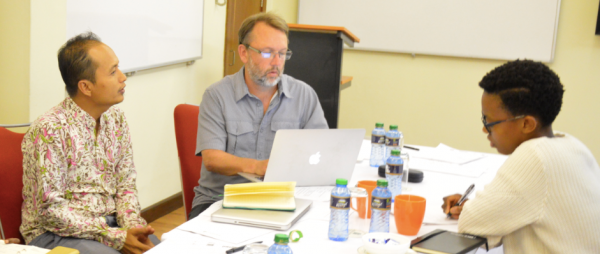The adoption of participatory budgeting in different cities and local communities across the globe represents an impressive diffusion of public policy programmes. The most recent global participatory budgeting census identified approximately 3,000 programmes, with some of the greatest growth occurring in Sub-Saharan Africa and Southeast Asia.
Countries in Sub-Saharan Africa began to experiment with participatory budgeting in the early 2000s, but had more than 150 programmes by 2012. There are 250 programmes on the continent. Asia is also fertile ground for participatory budgeting growth as well, with Indonesia and the Philippines adding what may be thousands of participatory budgeting programmes since the early 2000s. Yet, rapid global diffusion hides an important, understudied aspect of participatory budgeting: How is participatory budgeting being adapted to such different contexts?
This was one of the main questions addressed in a workshop Making All Voices Count sponsored in Nairobi, Kenya on 14-15 July 2017. A group of 14 participatory budgeting and “participation” experts from nine different countries met to discuss the diffusion and adaptation of experiences of participatory budgeting around the world. The meeting is part of an effort to build cross-national, comparative knowledge for researchers and practitioners working with participatory budgeting. The results of the workshop will be published in a report on the state of participatory budgeting as it expands across the developing world.

Researchers and practitioners at the participatory budgeting workshop held in Nairobi
Brian Wampler (Boise State University) and Michael Touchton (University of Miami), coordinated the workshop and discuss the key findings with Osmany Porto de Oliveira (Federal University of Sao Paulo), who participated in the meeting.
Country experts reflected on similarities in participatory budgeting across contexts, as well as challenges they faced in their own countries. Discussions surrounded the decision-making process, citizen participation, and the role of technology in different cases. Several themes emerged from written reports and group discussions:
International organisations are important drivers of participatory budgeting
The World Bank, the EU, USAID, and many other international advocacy groups supported participatory budgeting adoption and implementation, especially in Sub-Saharan African countries. These organisations and many others continue to provide technical assistance for participatory budgeting around the developing world. Civil society organisations are also critical partners in participatory budgeting processes as they mobilise citizens and provide technical assistance to most participatory budgeting programmes.
Participatory budgeting occurs in heterogeneous institutional contexts
Contexts range from rural, low-resource environments to urban contexts with significant budgets and administrative capacity. This means that participatory budgeting in rural Kenya is quite different from participatory budgeting in urban Indonesia. Moreover, participatory budgeting is associated with different political projects in different contexts. It seems that principles of accountability on public spending, citizen participation, and transparency have overtaken the radical democratic ideal of participatory budgeting’s origins in Porto Alegre in Brazil.
There is not a standard practice for decision-making across participatory budgeting programmes
In some cases, project selection occurs through voting via secret ballot or a show of hands. In contrast, many other programmes select projects via negotiations and consensus. Adopting participatory budgeting can serve as an important instrument to empower citizens that have been historically excluded from political process, especially in Sub-Saharan Africa. Participatory budgeting has the theoretical potential to reform traditional power dynamics and engage women, youths, the elderly, and members of ethnic minority groups. However, citizens in rural areas face difficulties attending deliberative forums and providing input on project selection. Furthermore, many programmes are not always successful in incorporating women and other marginalised populations. Finally, technology is an important way to mobilise participants, but it still not very widespread and is not central to participatory budgeting programmes in Sub-Saharan Africa and South East Asia.
Next steps for further research
Producing knowledge on participatory budgeting is very important as programmes continue to spread across Africa and Asia. The reports and collaborative discussions from the Making All Voices Count workshop are part of a new moment of knowledge production on participatory budgeting. This workshop represents one of the first steps beyond research focused on Latin America and Europe. In spite of participatory budgeting global diffusion, a major question still needs clarification: in which circumstances should participatory budgeting be adopted and, especially, when should it not? These are the next research steps that we hope to address for governments, advocacy groups, and civil society partners.
About the author
Dr Brian Wampler works in the School of Public Service at Boise State University, Idaho, USA. He is leading a research project to understand how participatory budgeting has been adapted in six countries in Sub-Saharan Africa and Southeast Asia. Michael Touchton works in the Political Science Department at University of Miami. He evaluates the impact of participatory budgeting in diverse contexts. Osmany Porto de Oliveira works in the International Relations Department at Federal University of Sao Paolo. He works on the international diffusion of participatory budgeting and is interested in the role of international and transnational institutions.Related content
-
PROJECT | March 1, 2017
The diffusion and adaptation of participatory budgeting -
BLOG | August 22, 2017
Practitioner reflections on the diffusion and adaptation of participatory budgeting… -
PROJECT | June 17, 2016
Improving the transparency, inclusivity and impact of participatory budgeting in… -
PROJECT | February 1, 2017
Making participatory budgeting a reality in Kenya -
PUBLICATION | January 19, 2017
Participatory budgeting in Indonesia: past, present and future -
PUBLICATION | January 19, 2017
Improving the transparency, inclusivity and impact of participatory budgeting in…